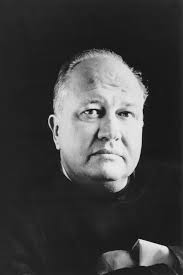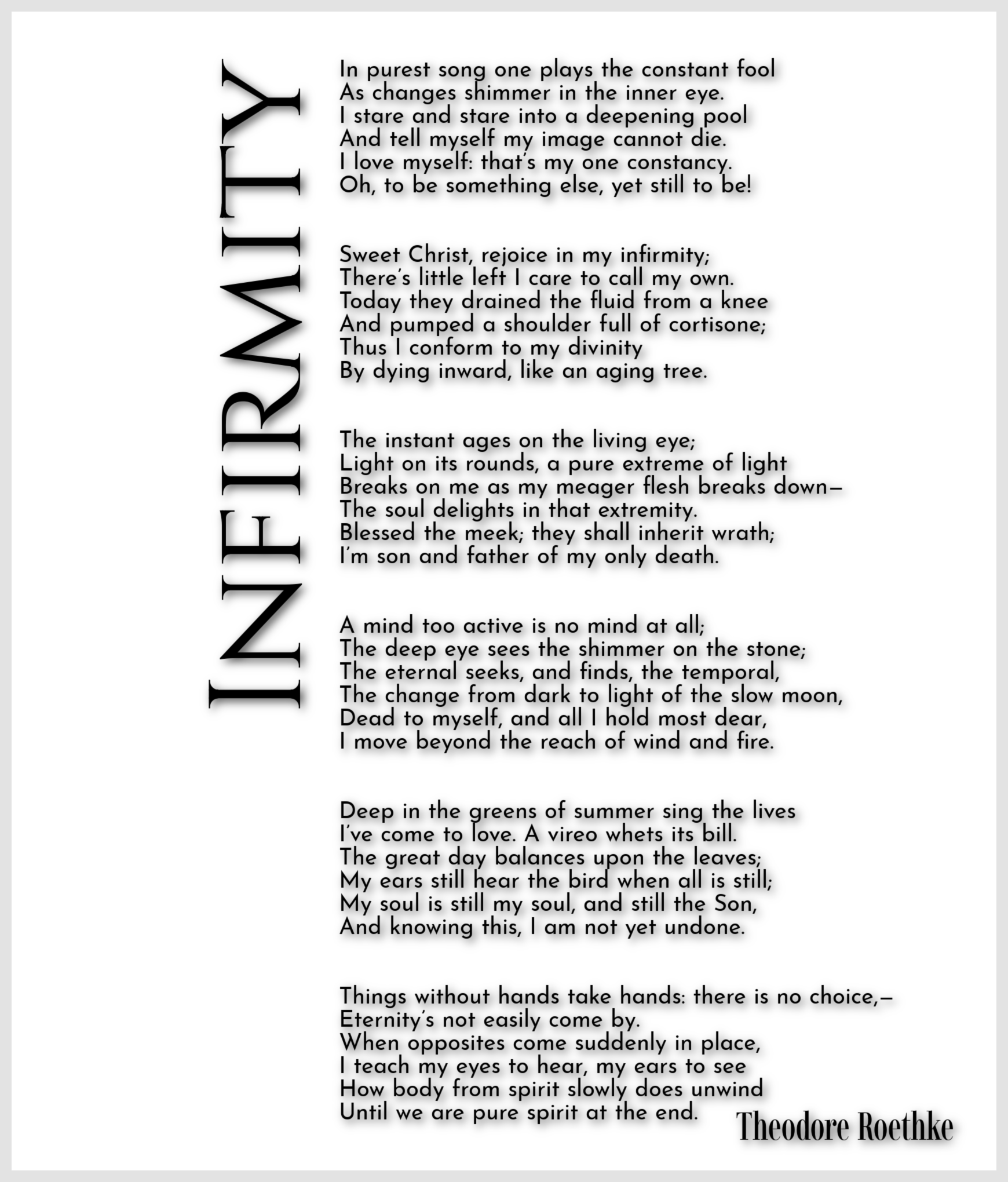
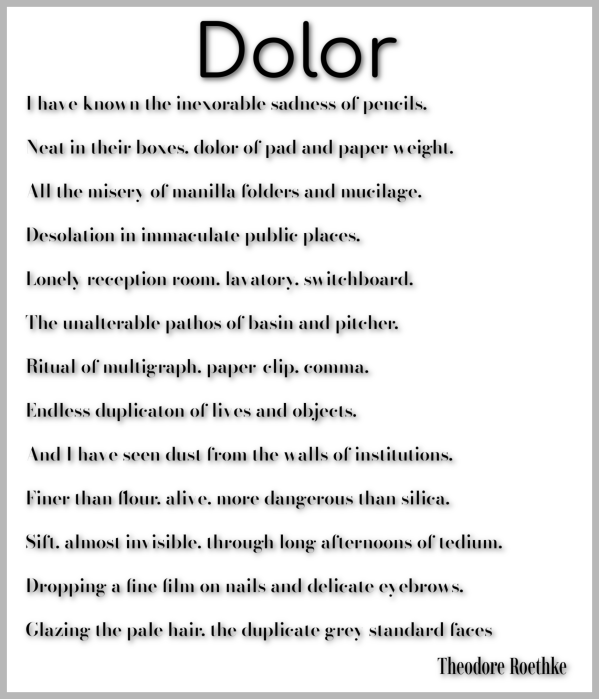
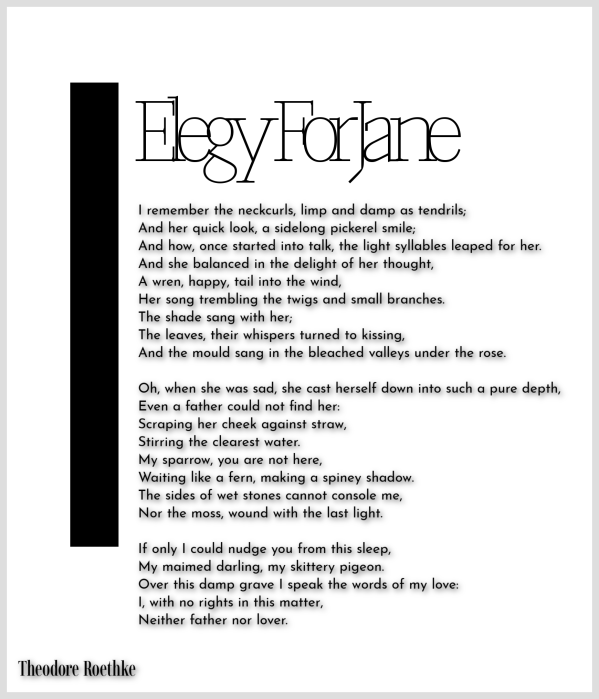
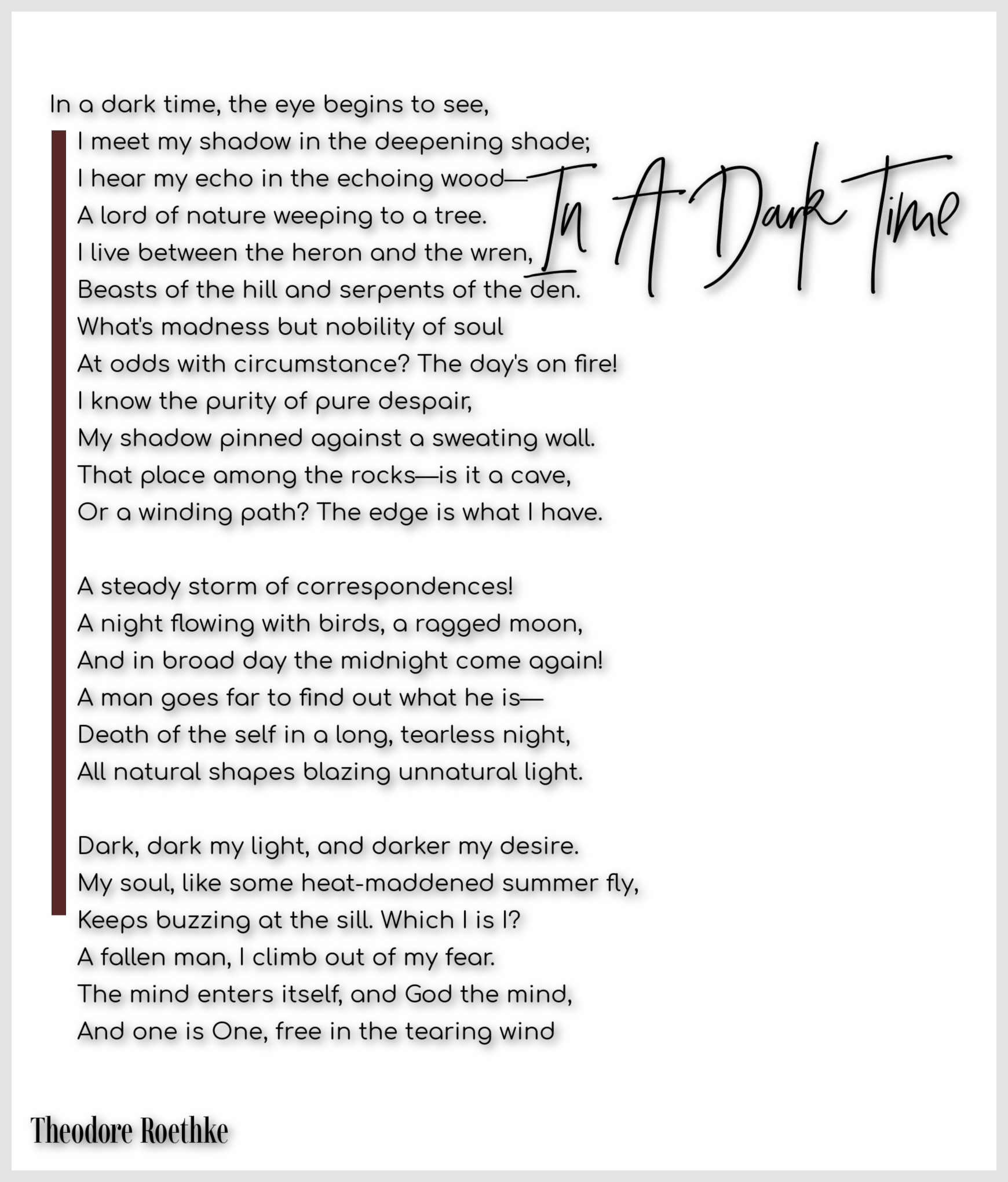
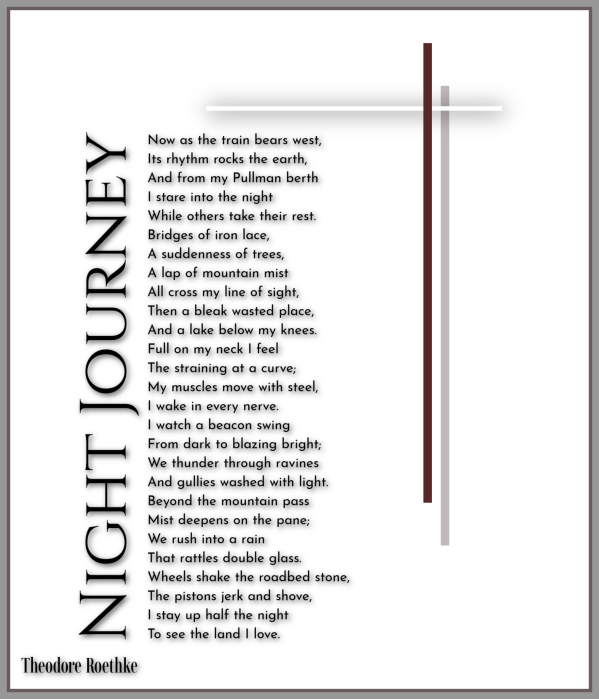
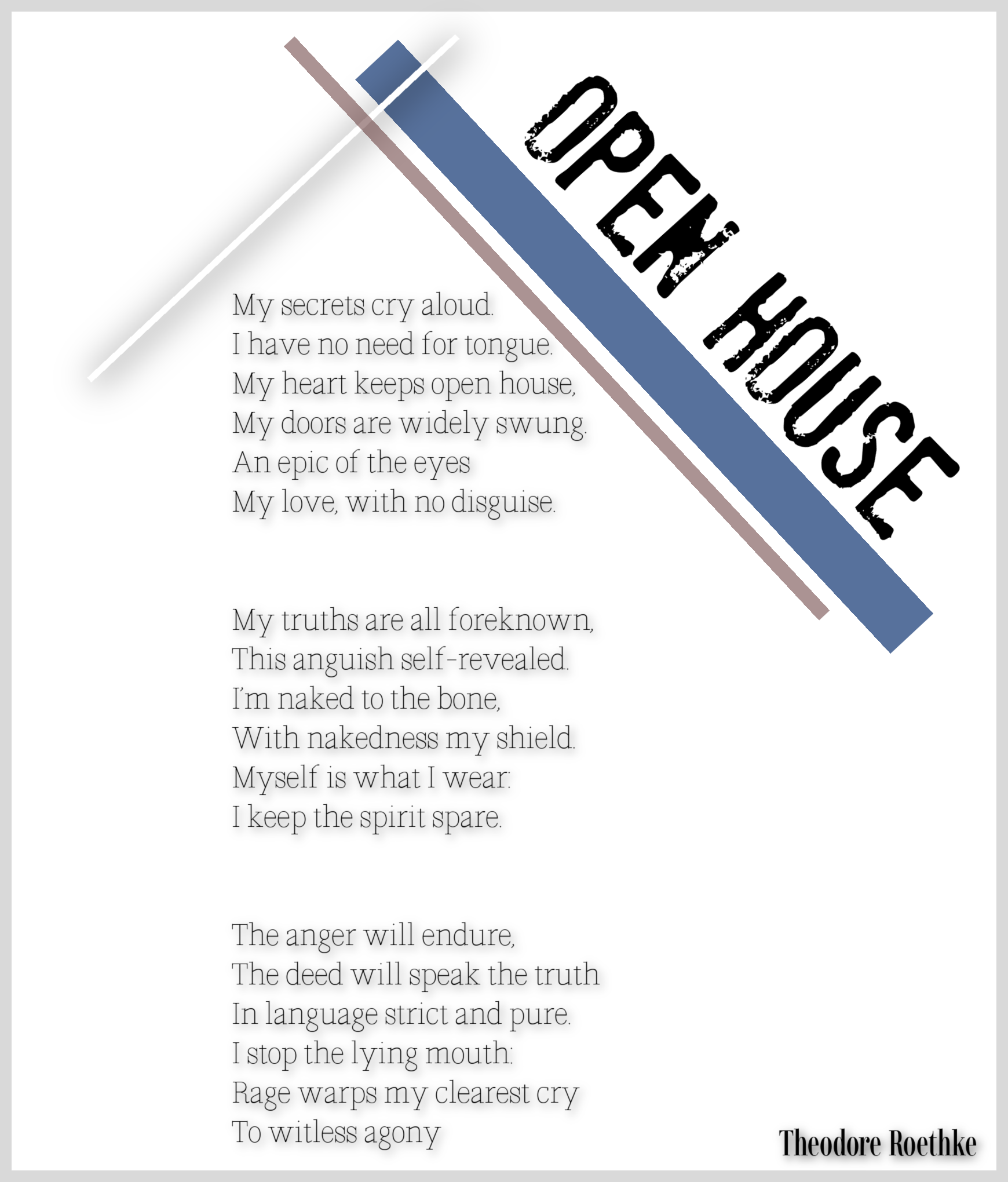
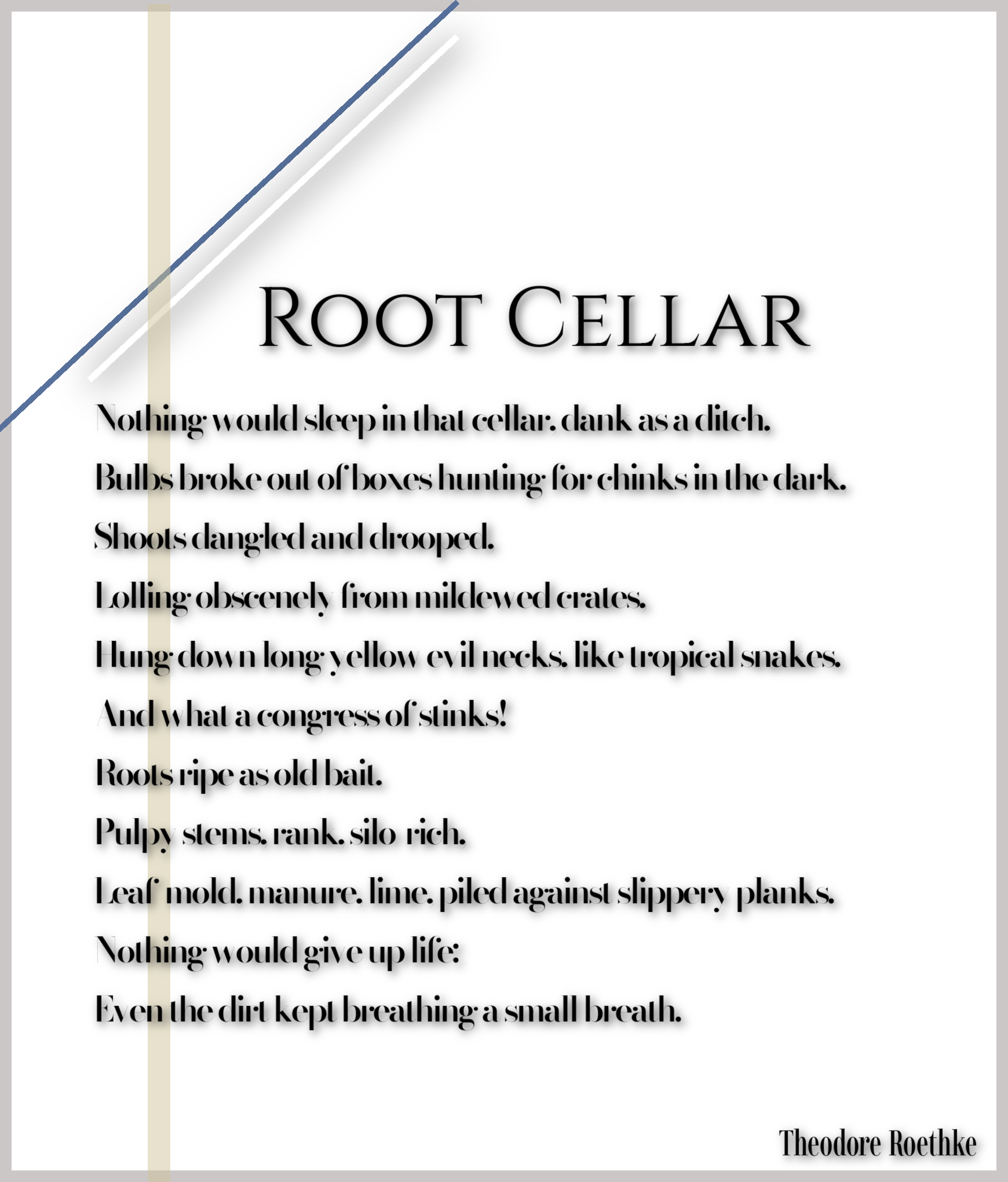
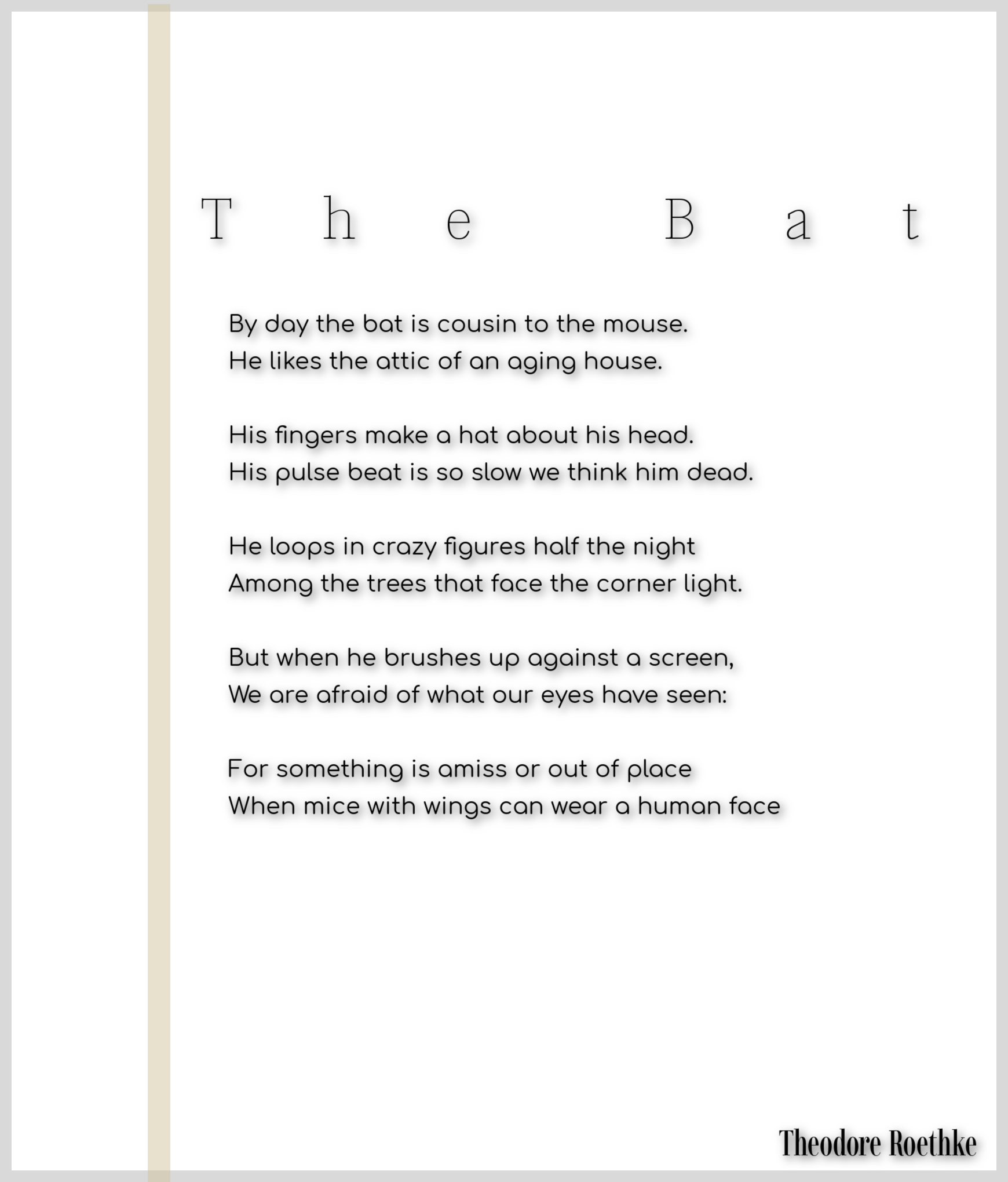
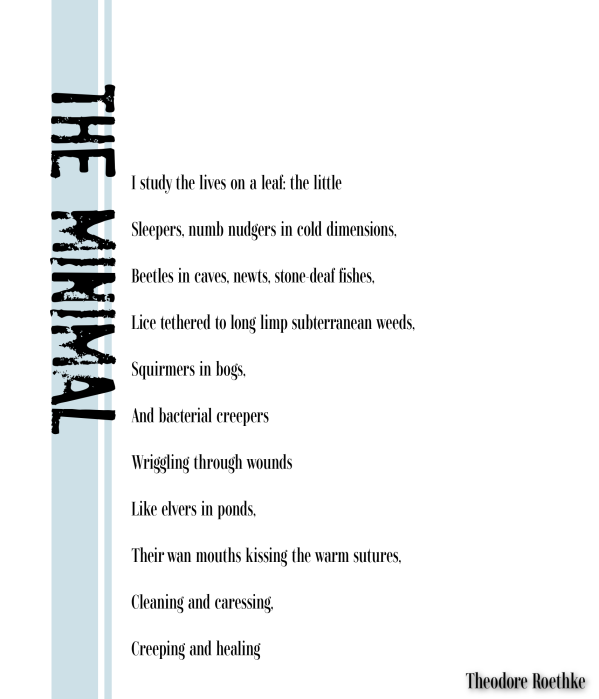
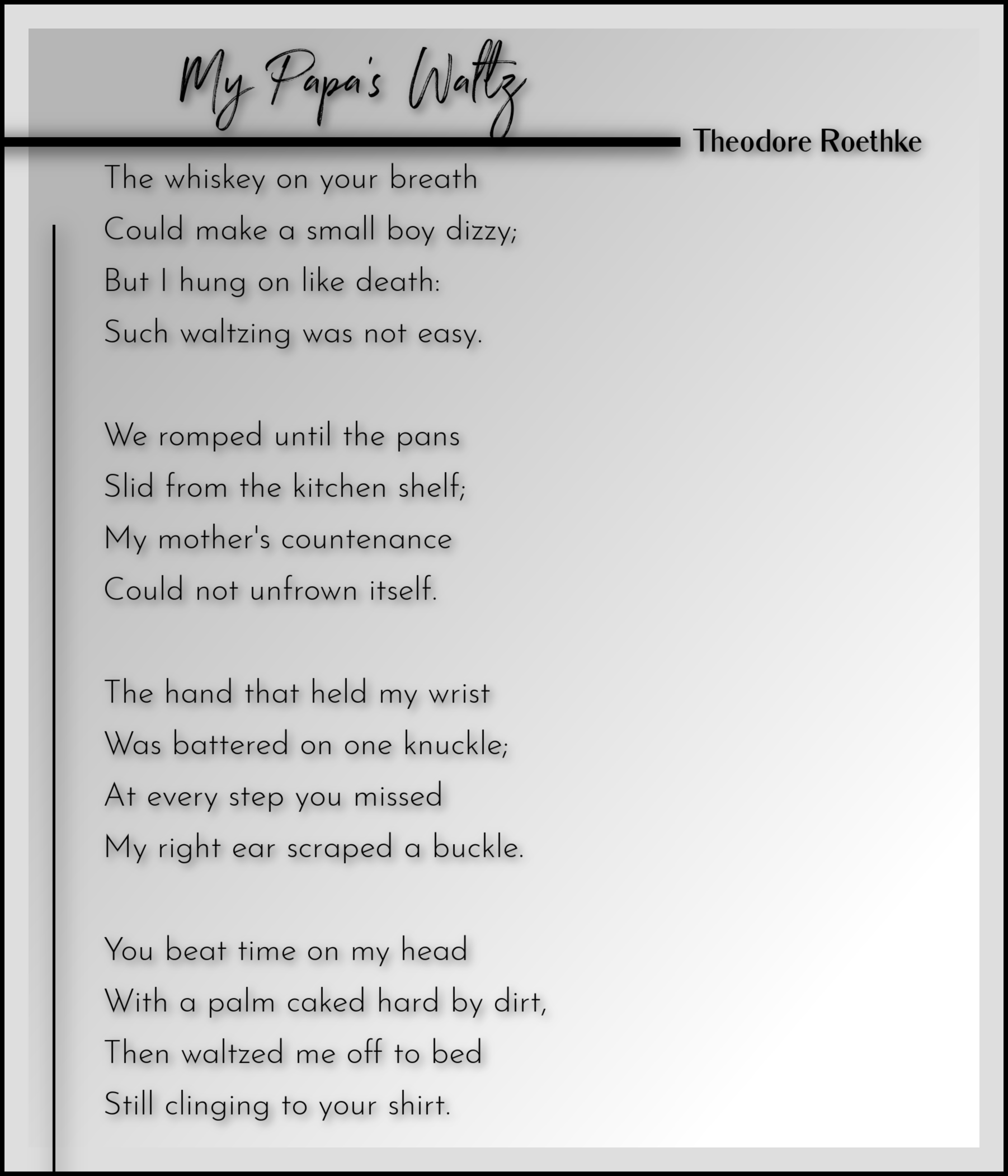
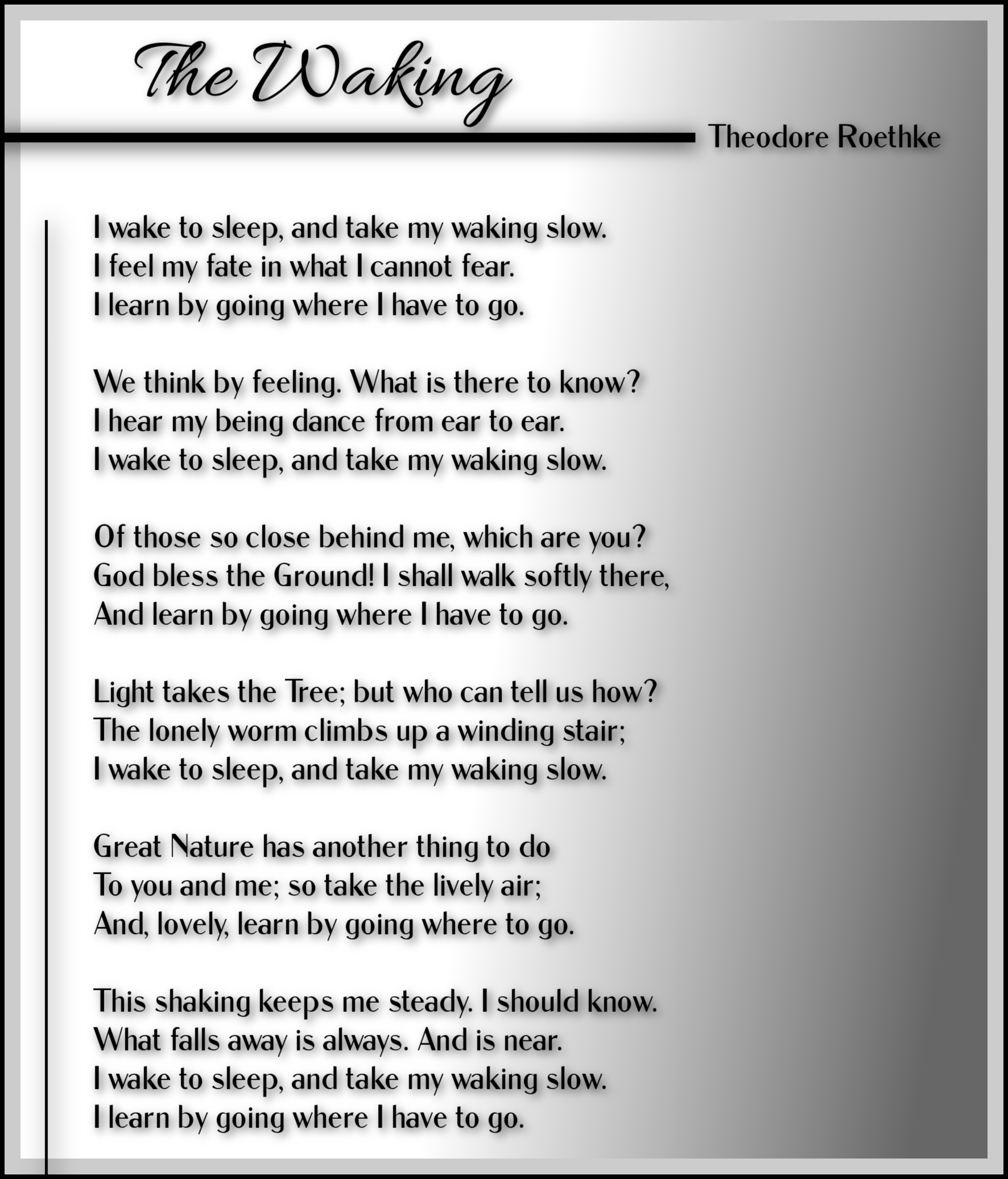
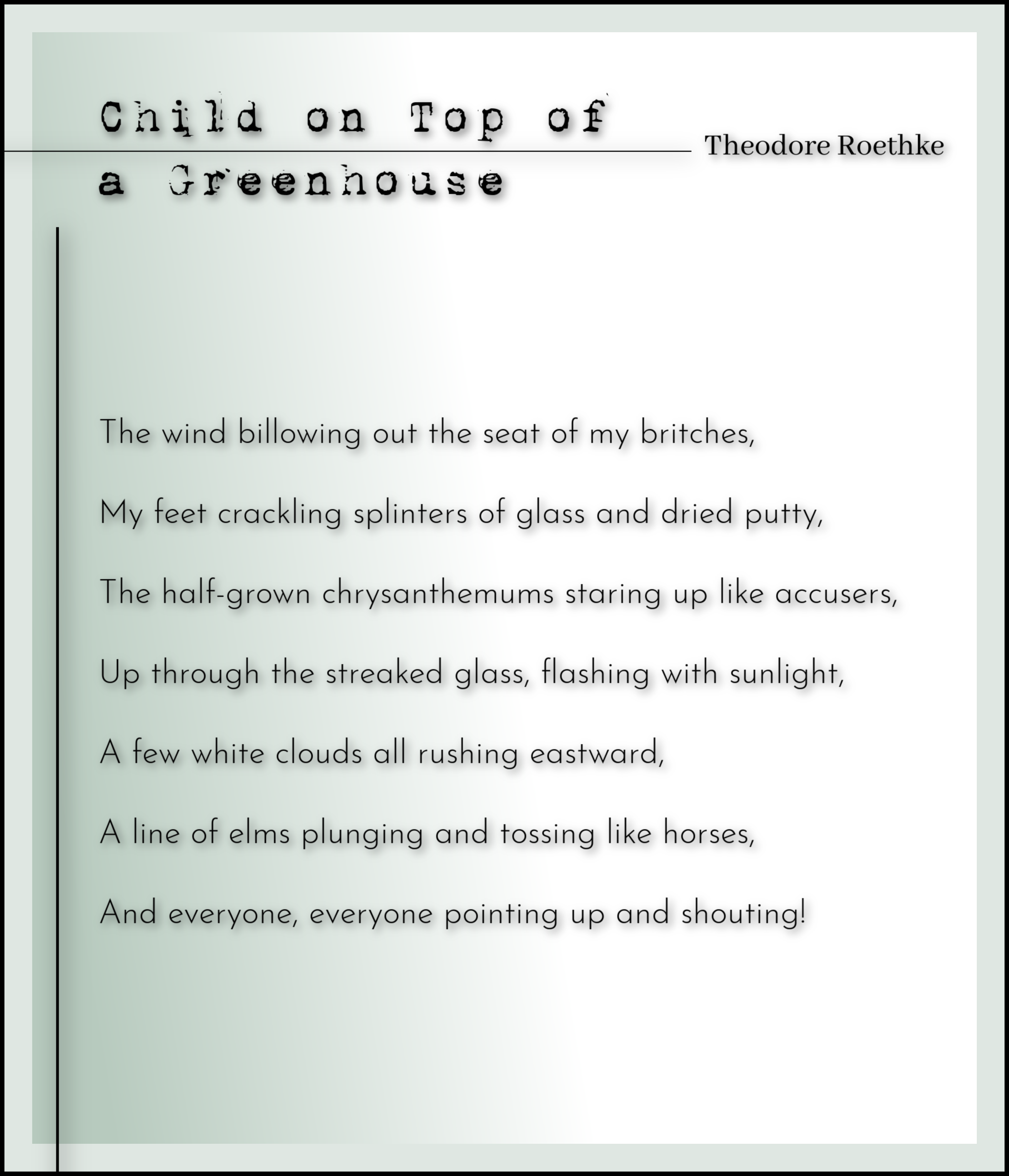
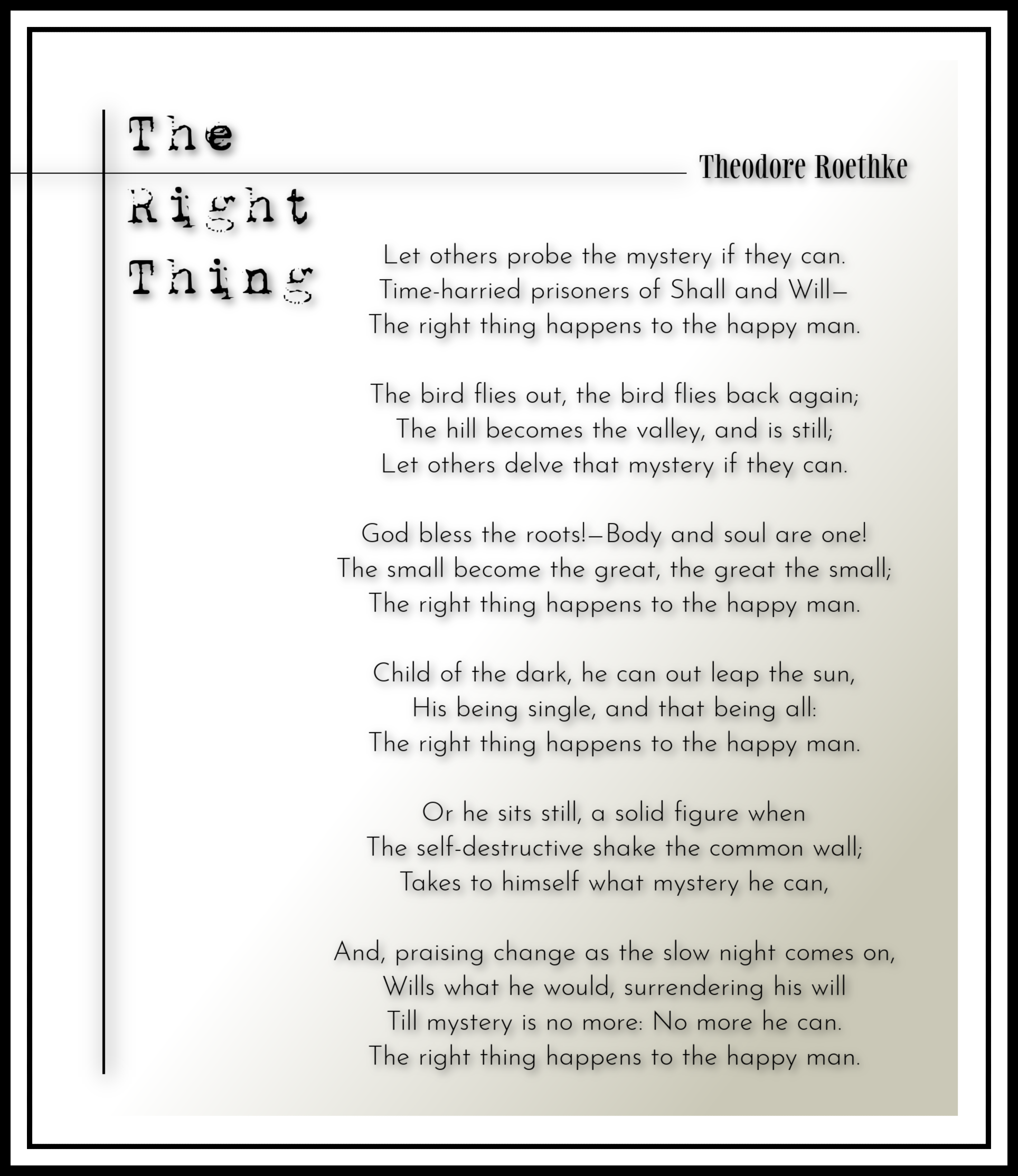
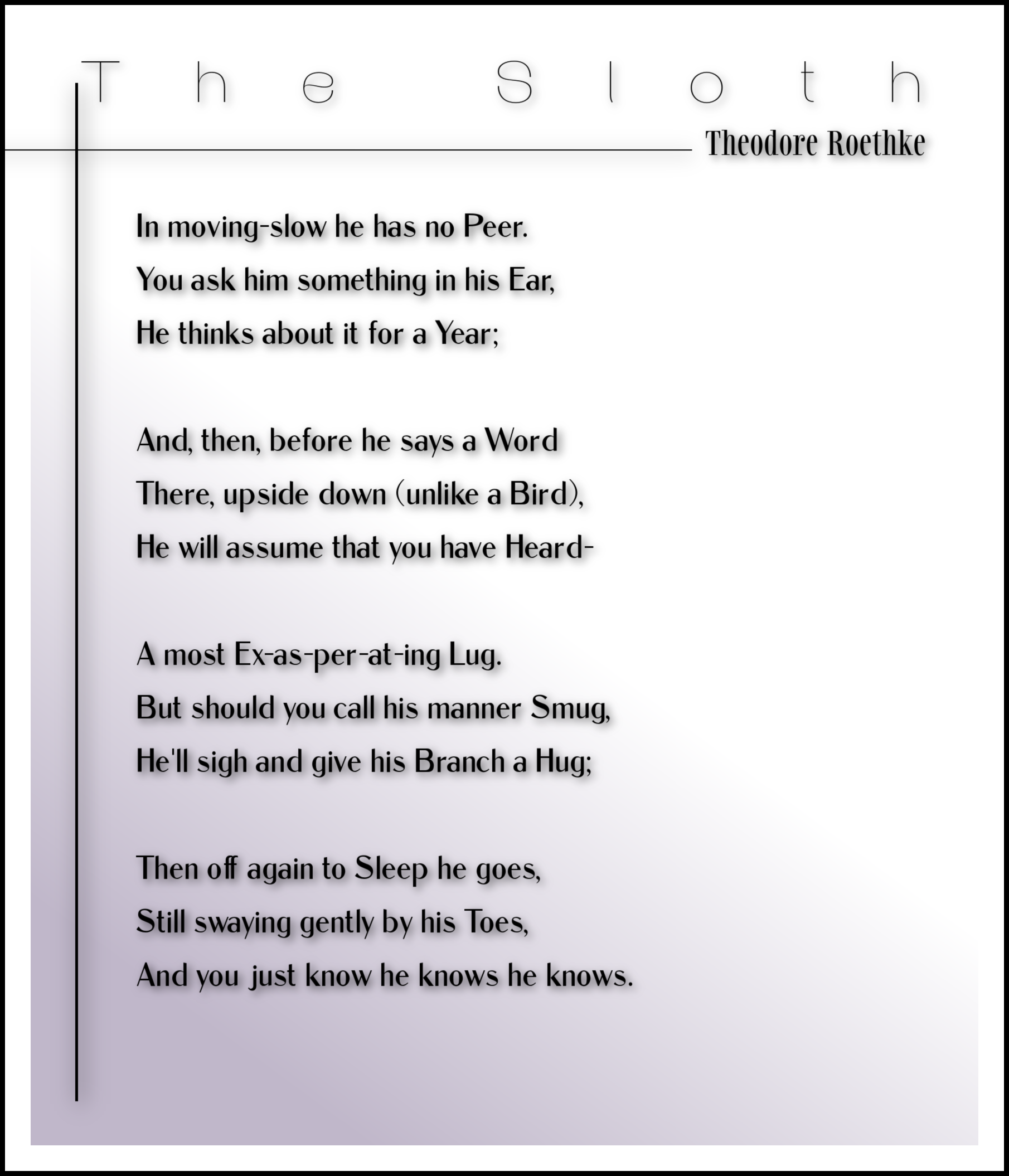
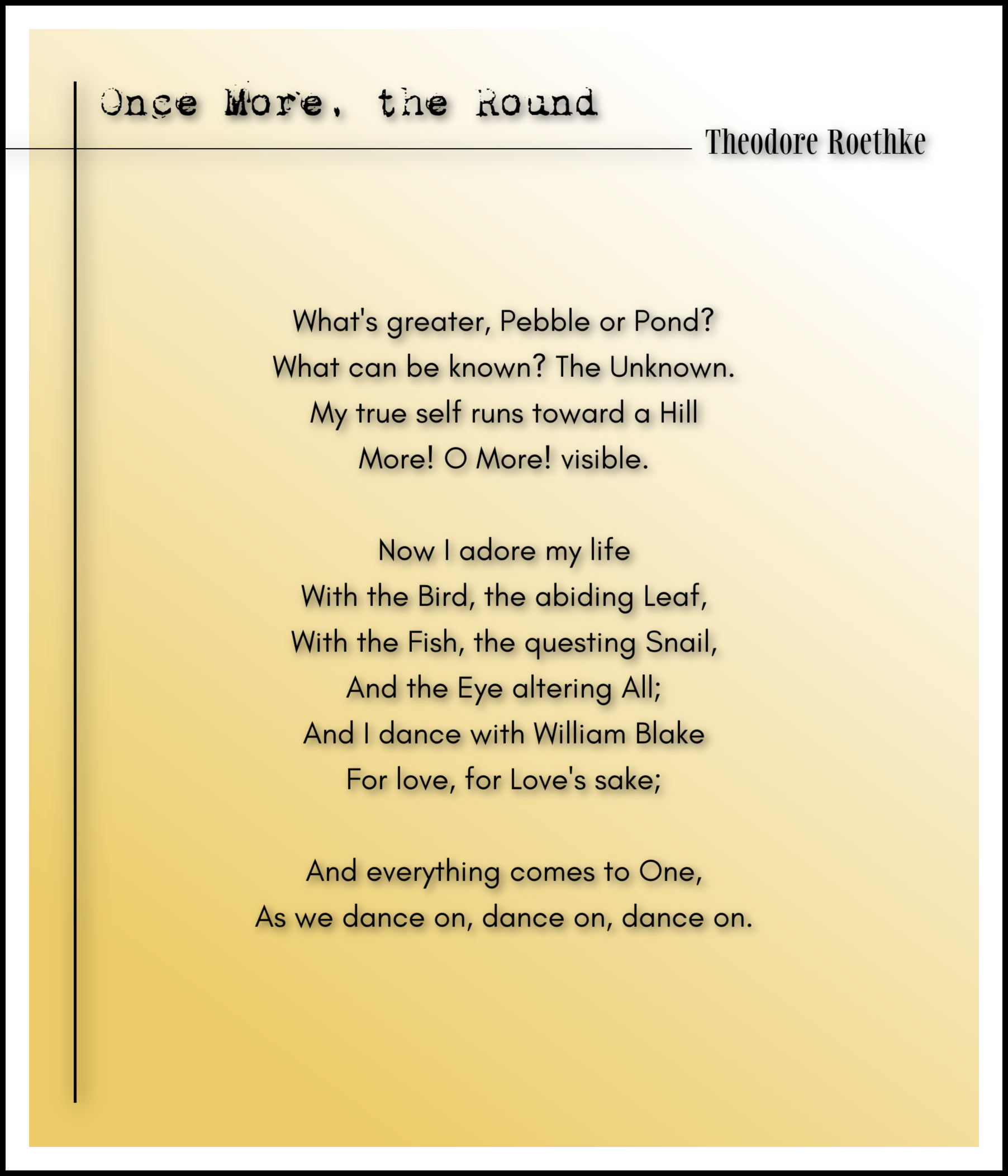
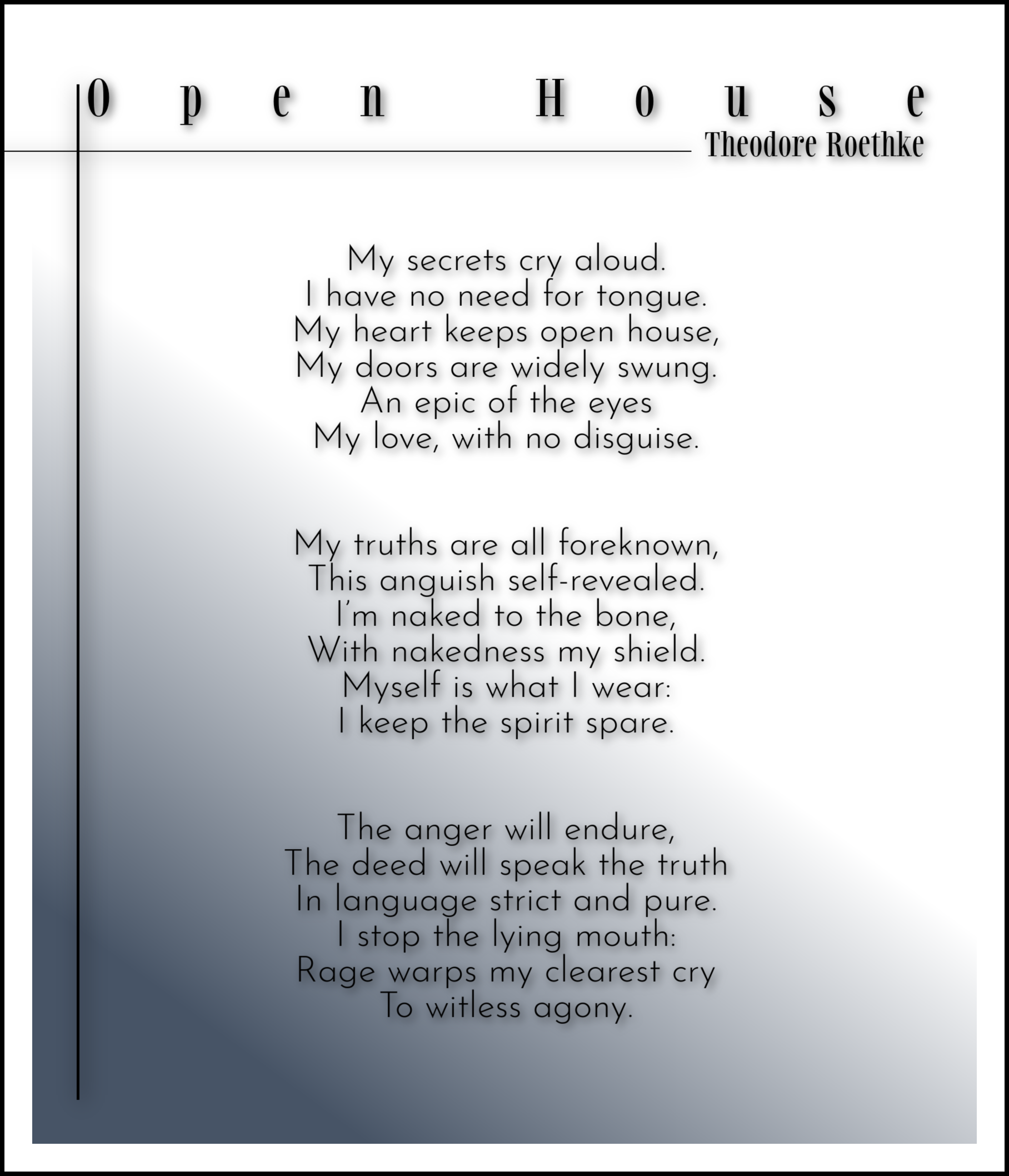
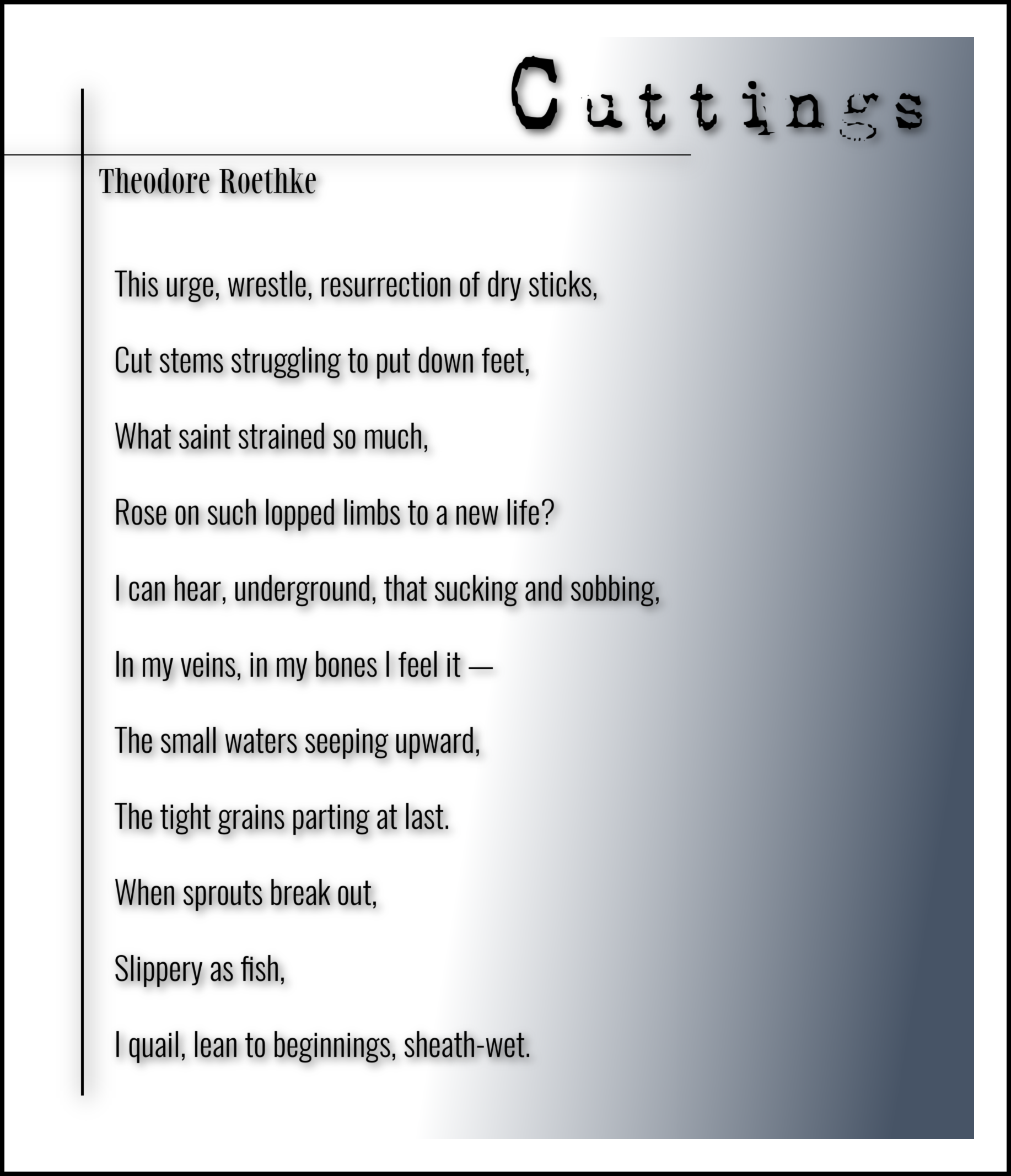
I Knew a Woman
I knew a woman, lovely in her bones,
When small birds sighed, she would sigh back at them;
Ah, when she moved, she moved more ways than one:
The shapes a bright container can contain!
Of her choice virtues only gods should speak,
Or English poets who grew up on Greek
(I'd have them sing in a chorus, cheek to cheek).
How well her wishes went! She stroked my chin,
She taught me Turn, and Counter-turn, and Stand;
She taught me Touch, that undulant white skin;
I nibbled meekly from her proffered hand;
She was the sickle; I, poor I, the rake,
Coming behind her for her pretty sake
(But what prodigious mowing we did make).
Love likes a gander, and adores a goose:
Her full lips pursed, the errant notes to seize;
She played it quick, she played it light and loose;
My eyes, they dazzled at her flowing knees;
Her several parts could keep a pure repose,
Or one hip quiver with a mobile nose
(She moved in circles, and those circles moved).
Let seed be grass, and grass turn into hay:
I'm martyr to a motion not my own;
What's freedom for? To know eternity.
I swear she cast a shadow white as stone.
But who would count eternity in days?
These old bones live to learn her wanton ways:
(I measure time by how a body sways).
The Meadow Mouse
1
In a shoe box stuffed in an old nylon stocking
Sleeps the baby mouse I found in the meadow,
Where he trembled and shook beneath a stick
Till I caught him up by the tail and brought him in,
Cradled in my hand,
A little quaker, the whole body of him trembling,
His absurd whiskers sticking out like a cartoon-mouse,
His feet like small leaves,
Little lizard-feet,
Whitish and spread wide when he tried to struggle away,
Wriggling like a minuscule puppy.
Now he's eaten his three kinds of cheese and drunk from his
bottle-cap watering-trough—
So much he just lies in one corner,
His tail curled under him, his belly big
As his head; his bat-like ears
Twitching, tilting toward the least sound.
Do I imagine he no longer trembles
When I come close to him?
He seems no longer to tremble.
2
But this morning the shoe-box house on the back porch is empty.
Where has he gone, my meadow mouse,
My thumb of a child that nuzzled in my palm? —
To run under the hawk's wing,
Under the eye of the great owl watching from the elm-tree,
To live by courtesy of the shrike, the snake, the tom-cat.
I think of the nestling fallen into the deep grass,
The turtle gasping in the dusty rubble of the highway,
The paralytic stunned in the tub, and the water rising,—
All things innocent, hapless, forsaken.
Once More, the Round
What's greater, Pebble or Pond?
What can be known? The Unknown.
My true self runs toward a Hill
More! O More! visible.
Now I adore my life
With the Bird, the abiding Leaf,
With the Fish, the questing Snail,
And the Eye altering All;
And I dance with William Blake
For love, for Love's sake;
And everything comes to One,
As we dance on, dance on, dance on.
Snake
I saw a young snake glide
Out of the mottled shade
And hang, limp on a stone:
A thin mouth, and a tongue
Stayed, in the still air.
It turned; it drew away;
Its shadow bent in half;
It quickened and was gone
I felt my slow blood warm.
I longed to be that thing.
The pure, sensuous form.
And I may be, some time.
The Geranium
When I put her out, once, by the garbage pail,
She looked so limp and bedraggled,
So foolish and trusting, like a sick poodle,
Or a wizened aster in late September,
I brought her back in again
For a new routine—
Vitamins, water, and whatever
Sustenance seemed sensible
At the time: she'd lived
So long on gin, bobbie pins, half-smoked cigars, dead beer,
Her shriveled petals falling
On the faded carpet, the stale
Steak grease stuck to her fuzzy leaves.
(Dried-out, she creaked like a tulip.)
The things she endured!—
The dumb dames shrieking half the night
Or the two of us, alone, both seedy,
Me breathing booze at her,
She leaning out of her pot toward the window.
Near the end, she seemed almost to hear me—
And that was scary—
So when that snuffling cretin of a maid
Threw her, pot and all, into the trash-can,
I said nothing.
But I sacked the presumptuous hag the next week,
I was that lonely.
The Reckoning
All profits disappear: the gain
Of ease, the hoarded, secret sum;
And now grim digits of old pain
Return to litter up our home.
We hunt the cause of ruin, add,
Subtract, and put ourselves in pawn;
For all our scratching on the pad,
We cannot trace the error down.
What we are seeking is a fare
One way, a chance to be secure:
The lack that keeps us what we are,
The penny that usurps the poor.
In A Dark Time
In a dark time, the eye begins to see,
I meet my shadow in the deepening shade;
I hear my echo in the echoing wood—
A lord of nature weeping to a tree.
I live between the heron and the wren,
Beasts of the hill and serpents of the den.
What's madness but nobility of soul
At odds with circumstance? The day's on fire!
I know the purity of pure despair,
My shadow pinned against a sweating wall.
That place among the rocks—is it a cave,
Or a winding path? The edge is what I have.
A steady storm of correspondences!
A night flowing with birds, a ragged moon,
And in broad day the midnight come again!
A man goes far to find out what he is—
Death of the self in a long, tearless night,
All natural shapes blazing unnatural light.
Dark, dark my light, and darker my desire.
My soul, like some heat-maddened summer fly,
Keeps buzzing at the sill. Which I is I?
A fallen man, I climb out of my fear.
The mind enters itself, and God the mind,
And one is One, free in the tearing wind.
The Storm
1
Against the stone breakwater,
Only an ominous lapping,
While the wind whines overhead,
Coming down from the mountain,
Whistling between the arbors, the winding terraces;
A thin whine of wires, a rattling and flapping of leaves,
And the small street-lamp swinging and slamming against
the lamp pole.
Where have the people gone?
There is one light on the mountain.
2
Along the sea-wall, a steady sloshing of the swell,
The waves not yet high, but even,
Coming closer and closer upon each other;
A fine fume of rain driving in from the sea,
Riddling the sand, like a wide spray of buckshot,
The wind from the sea and the wind from the mountain contending,
Flicking the foam from the whitecaps straight upward into the darkness.
A time to go home!—
And a child's dirty shift billows upward out of an alley,
A cat runs from the wind as we do,
Between the whitening trees, up Santa Lucia,
Where the heavy door unlocks,
And our breath comes more easy—
Then a crack of thunder, and the black rain runs over us, over
The flat-roofed houses, coming down in gusts, beating
The walls, the slatted windows, driving
The last watcher indoors, moving the cardplayers closer
To their cards, their anisette.
3
We creep to our bed, and its straw mattress.
We wait; we listen.
The storm lulls off, then redoubles,
Bending the trees half-way down to the ground,
Shaking loose the last wizened oranges in the orchard,
Flattening the limber carnations.
A spider eases himself down from a swaying light-bulb,
Running over the coverlet, down under the iron bedstead.
Water roars into the cistern.
We lie closer on the gritty pillow,
Breathing heavily, hoping—
For the great last leap of the wave over the breakwater,
The flat boom on the beach of the towering sea-swell,
The sudden shudder as the jutting sea-cliff collapses,
And the hurricane drives the dead straw into the living pine-tree.
Infirmity
In purest song one plays the constant fool
As changes shimmer in the inner eye.
I stare and stare into a deepening pool
And tell myself my image cannot die.
I love myself: that’s my one constancy.
Oh, to be something else, yet still to be!
Sweet Christ, rejoice in my infirmity;
There’s little left I care to call my own.
Today they drained the fluid from a knee
And pumped a shoulder full of cortisone;
Thus I conform to my divinity
By dying inward, like an aging tree.
The instant ages on the living eye;
Light on its rounds, a pure extreme of light
Breaks on me as my meager flesh breaks down—
The soul delights in that extremity.
Blessed the meek; they shall inherit wrath;
I’m son and father of my only death.
A mind too active is no mind at all;
The deep eye sees the shimmer on the stone;
The eternal seeks, and finds, the temporal,
The change from dark to light of the slow moon,
Dead to myself, and all I hold most dear,
I move beyond the reach of wind and fire.
Deep in the greens of summer sing the lives
I’ve come to love. A vireo whets its bill.
The great day balances upon the leaves;
My ears still hear the bird when all is still;
My soul is still my soul, and still the Son,
And knowing this, I am not yet undone.
Things without hands take hands: there is no choice,—
Eternity’s not easily come by.
When opposites come suddenly in place,
I teach my eyes to hear, my ears to see
How body from spirit slowly does unwind
Until we are pure spirit at the end.
|
|
